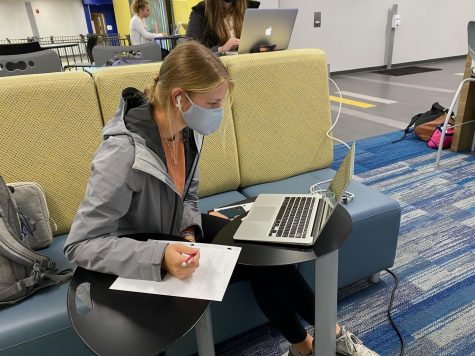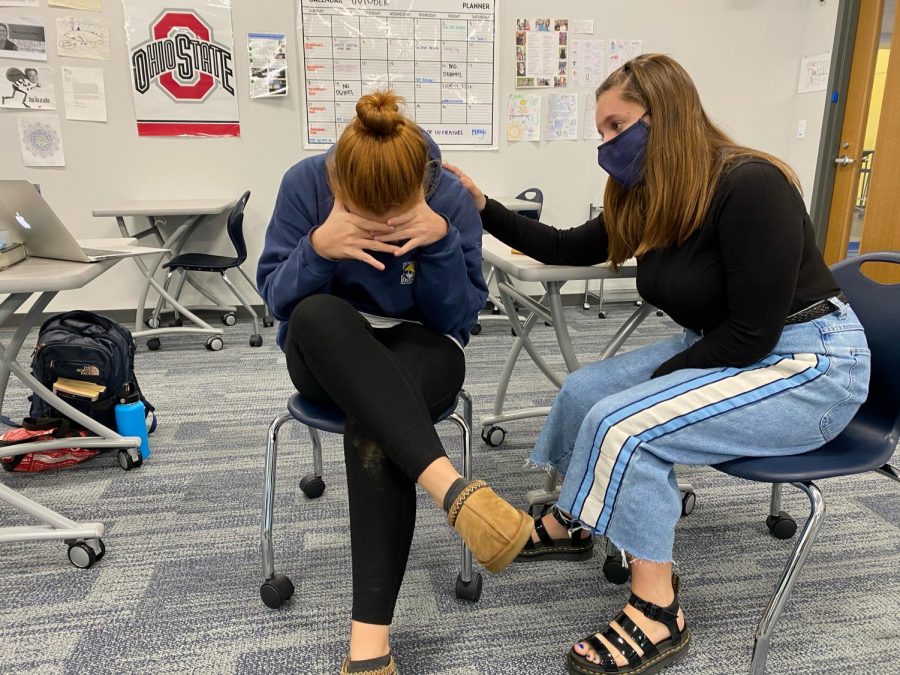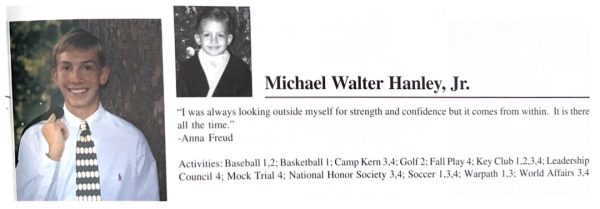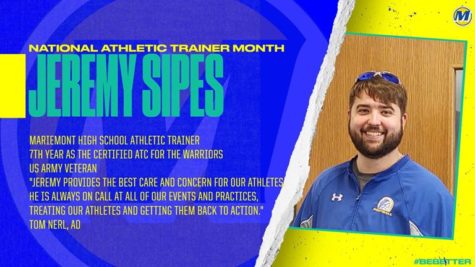Self Care at MHS: How Can We Manage These New Variables?
Junior Cricket Collister consoles senior Olivia Simpson as she is stressed about college applications.
October 20, 2020
BY MCKENZIE ZOBRIST
Stress has always been a common word in high school vocabulary, but what does stress really mean today?
As seniors and juniors are worried about college, freshmen and sophomores are worried about making connections.
Missing out on key parts of the college decision process is proving to be a stressor for many. Junior Ally Frye said, “I know my classmates and I are already starting to stress. Corona has definitely played a role in this process as I already had 2 ACT’s cancelled, and college tours still aren’t happening, so it’s hard to get an idea of what kind of college I’d even want to consider.”
Sophomores and freshmen have just begun the high school experience and COVID is creating an awkward atmosphere.
Freshman Lucy Dorn said, “The only thing that is upsetting is the lack of partner and group work because of COVID precautions. This is a main part of school and working with other people helps me get a better understanding of learning.”
With the introduction of Schoology, zoom, online learners, and online tests, most agree that technology was a big change this year that has caused stress among teachers and students.
English teacher Mr. Wiseman said, “I feel like I need to be on top of things, and that I need to have things more organized, and then all of these other variables that are constantly changing have made me mindful that I need to be better at self care, but I’m finding it hard to be really intentional about it.”

Inside Look In a chaotic house of twins with college applications, senior year, athletics, extracurriculars, and jobs on the mind, I can tell you it gets loud. As many of you know, stress brings arguments, frustration, tears, and other emotions you feel you don’t have a handle over– whether they make sense or not.
The issue in our house is we both handle stress differently. Mrs. Tackett, Mariemont High School counselor, explained how people handle stress differently: one way that works for one person may make the other person more anxious. Mrs. Tackett said, “We have to be careful because something that works for someone might not work for someone else.”
The Difference Assignment, test, due date, essay, work, mask, tech, video… it all repeats in my mind, and if i don’t get it done fast, I won’t focus on anything else in the day. Does this sound like you? One practice that can help combat this is a research based practice called Dialectical Behavior Therapy (DBT).
Mrs Tackett said, “I do think DBT is helpful to some– maybe not to all– but for the person, especially a senior, who has a long laundry list of things to do,it can be helpful as long as you don’t view it as one more thing to do.”
Does making the time to create a list make you more anxious? Does the work, test, assignment, application… list in your head work better? “If a list doesn’t work for you, maybe try listing things in your head: three things I’m going to get done today. And then you know those are the three things you’re going to do,” said Mrs. Tackett, “You may have 20 things to get done, but getting at least three done will feel good to you.”
Or does something else work better for you?
How to Handle It If you take a moment to reflect on your habits (what stresses you and what calms you down) you can choose the best way(s) to go about this anxiousness:
- The list:
- Write down everything on your mind in bullet points, and then cross off what you know you can get done/what you’ve already accomplished. Take a second and look at the list. Keep the list, and refer back to it when you need to know what to do next.
- The memory:
- Take a second to think about what needs done today. Figure out how you will accomplish it. Once you get that done, choose something else for the next day.
- Take time for yourself
- Listen to your body. Some days, we need to take a step back from school, work, sports, and activities, and that’s okay. Some ways to take time to reflect on yourself are:
- Practice mindfulness
- Yoga
- Read a book
- Take a bath
- Disconnect from technology
- Listen to your body. Some days, we need to take a step back from school, work, sports, and activities, and that’s okay. Some ways to take time to reflect on yourself are:
- Ask a friend
- Sometimes people have different ways of handling stress that could work for you. If you’re struggling to find the best way for you, ask a friend what they do.
Advice One of the biggest pieces of advice I’ve gotten is to take a look at the situation and realize you “could” handle it or do it instead of thinking you “should” handle it or do it or deal with it. One should never have to put the weight of the world on themself. A resource that I and many peers would recommend is the counselor’s office in our school if you’re looking for some support. One of the best ways to relieve stress is to talk about it.
Mrs. Tackett recommends having a positive attitude in the morning. She said, “You do need to take care of yourself. You need to give yourself grace and realize that things aren’t always going to be quite the way we want them to be.”
“I’ve been trying to think positive and know that there’s no reason to dwell on the parts of high school that we are missing out on, and to focus on the good parts that still are still happening,” said freshman Lucy Dorn.
Resources
Counselors:
- Mrs. Tackett: [email protected]
- Mrs. Zaya: [email protected]
- Mrs. Leszczuk (college counselor): [email protected]
All Teachers:
If something is on your mind, don’t be afraid to talk to your teachers. A common statement from teachers is that they have your best interest in mind. A teacher will not turn down an opportunity to help you with something you’re struggling with whether that be school-related or personal.
Mr. Wiseman said, “Another thing that really helps this year especially is being human with each other, and realizing that we’re all in this together.”
Parents:
Mrs. Tackett said, “My biggest piece of advice to students and teachers would be to talk to someone. Whether that be a teacher, parent, or friend, we’re all trying to get through this together.”
Friends:
No matter what you’re going through, friends and peers will be there to have your back. Consider talking to a friend if you feel as though you can’t see an adult right away. Your friend might offer support to help you seek assistance from an adult.
Mrs. Tackett said, “Natalie Utt shared her story about how she knew something wasn’t right for her which led to anxiety and eventually an eating disorder, and Natalie and I worked very closely together, and she had a lot of friends, teachers, and administrators that helped her through it.”
Sources of Strength Club Members:
Sources of Strength (SOSMont) is a club organized to create a better school climate. Each and every member of the club was selected to participate because other students said the members would be an individual they’d go to for help. “SOSMont is essentially a student-led club where the students in it are elected by their peers as someone they feel safe coming to for help,” said senior SOSMont member Lucy Dodson.
Members Include:
Staff:
- Mrs. Eckroth: [email protected]
- Mr. Sugerman: [email protected]
- Mrs. Lowery: [email protected]
- Mrs. McGahey: [email protected]
- Mrs. Morris: [email protected]
- Mrs. Szabo: [email protected]
- Mrs. Timmerding: [email protected]
- Mr. Vilardo: [email protected]
Seniors:
- Lucy Dodson: [email protected]
- Henry Renie: [email protected]
- Avery Messner: [email protected]
- Chase Hollander: [email protected]
- Jeb Lindell: [email protected]
- Josie Bloom: [email protected]
- Kiersten Souders: [email protected]
- Liv Ferry: [email protected]
- Monroe Nichols: [email protected]
- Tony Mershon: [email protected]
- Will Fahnestock: [email protected]
Juniors:
- Ashley Stahl: [email protected]
- Daniel Cooper: [email protected]
- Ellson Vanscoy: [email protected]
- Ethan Dill: [email protected]
- Isabella Harris: [email protected]
- Jack Mileham: [email protected]
- Lorilei Blackett: [email protected]
- Lucy Jacobs: [email protected]
- Max Miller: [email protected]
- Tom Buchert: [email protected]
Sophomores:
- Caroline Soller: [email protected]
- Laney Riportella: [email protected]
- Luke Brennaman: [email protected]
- Max Marquez: [email protected]
- Sophia Hunt: [email protected]
- Tim Ackerman: [email protected]
Freshmen:
- Charlie Tully: [email protected]
- Charlie Perkins: [email protected]
- Bella Mason: [email protected]
- Ben Hojnoski: [email protected]
- Brody Buswell: [email protected]
- Caleb Ching: [email protected]
- Ellie Haynes: [email protected]
- Isabella Drake: [email protected]
- Grace Flerlage: [email protected]
- Lilli Hoel: [email protected]
- Sophia Ware: [email protected]
- Topher Smyth: [email protected]
1N5.org 1N5 is an organization centered around mental health. Their slogan is, “Stop the Stigma”, which means they want to end the bad reputation mental health has around it. The website has many resources to talk about mental health, read others’ stories, and learn about mental health. People from in and out of our community have chosen to share their stories on 1N5: https://1n5.org/iam1n5-2/ .











